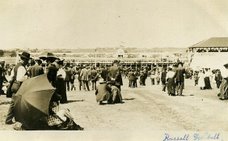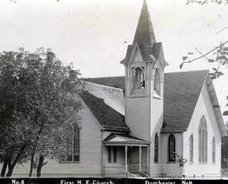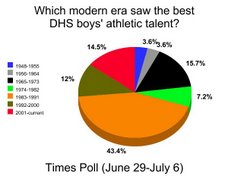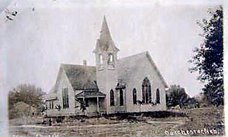
Here's a statistic village board members and other leaders in our community should note: nearly 13% of houses and apartments in Dorchester are unoccupied (vacancy rate). That's according to new information collected by Sterling's Best Places.
Nothing is harder on a town than vacant homes -- especially run-down, deteriorating vacant homes.
The village board has tried to make an example out of slum owners by bulldozing a vacant home on 9th Street, only to have the action stopped by a district judge. She said the owners were "working on the property." More than a year later, the garage collapsed with the weather and the empty home continues to fall apart. (Of course, her honor doesn't have to live next to the dilapidated property or worry about one of her kids get trapped under a falling garage wall.)
Perhaps its time for Plan B.
In 2009, this blog conducted an online poll in which nearly two-thirds of Times readers wanted the Dorchester Village Board to consider imposing a blight tax on neglected or abandoned properties in town. With more than 80 readers voting, 64% supported the blight tax concept. Another 14% said village board members should consider whether such a tax makes sense.
Blight tax revenue could be used to renovate Dorchester's main street, repair or pave streets, or enhance public spaces like the park.
Think it wouldn't work? The state of Georgia has experienced success with their statewide blight tax.
In Kennesaw, Ga., the city has imposed a tax penalty that is seven times the current property tax rate for property owners whose homes repeatedly violate city housing standards. This tax is levied only after repeated warnings and notices to address the problems.
We think it's worth considering in Dorchester.
In Kennesaw, Ga., the city has imposed a tax penalty that is seven times the current property tax rate for property owners whose homes repeatedly violate city housing standards. This tax is levied only after repeated warnings and notices to address the problems.
We think it's worth considering in Dorchester.


















































For any board members reading, run with this blight tax idea. It makes good sense.
ReplyDeleteHere is possible language to insert into the city codes, drafted by a lawer friend of mine:
------------------
Definition of Blight
Under the ordinance, a property is considered blighted if the village board or village manager/administrator determines that its condition threatens life or puts the health or safety of village residents at risk. It is also considered blighted if it:
1. is not being adequately maintained, e. g. , it has missing or boarded windows or doors;
2. has uncorrected building or health code violations;
3. has become a place where criminal activity has taken place as documented by the Saline Co. Sheriff's office;
4. a fire hazard as determined by the state fire marshal or as documented in Dorchester Volunteer Fire Department reports;
5. is a factor that is creating substantial risk of interference with the lawful use and enjoyment of other space within the building or other properties within the neighborhood, as documented by neighborhood complaints or cancellation of insurance policies;
6. is a factor that is seriously depreciating property values in the neighborhood.
7. contains unauthorized outside storage or accumulation of trash of any kind or parking for inoperable vehicles, boats, or other inoperable machinery on the property or the public right-of-way; or
8. has been vandalized, or otherwise damaged to the extent that it is seriously depreciating property values in the neighborhood.